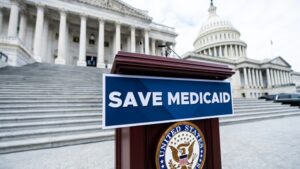Understanding the Impacts of Proposed Medicaid Cuts: What It Means for Your Finances
At Extreme Investor Network, we strive to keep you informed about issues that directly affect your personal finance journey. One significant and pressing concern on the horizon is the proposed cuts to Medicaid that could alter the financial landscape for millions of Americans. On February 25, 2024, House Republicans announced a budget resolution that could lead to approximately $880 billion in spending cuts over the next decade, with Medicaid—one of the nation’s largest healthcare programs—potentially in the crosshairs.
The Possible Fallout of Medicaid Cuts
Medicaid provides critical healthcare services to over 80 million Americans, including middle-class families, the elderly, and those requiring long-term care services. Any significant reductions to this program could have profound economic repercussions, particularly for low-income and struggling families. As Josh Bivens, chief economist at the Economic Policy Institute, notes, "it is very hard to imagine coming up with enough savings from what’s in their jurisdiction without a hefty cut to Medicaid, just given its size."
Though House Speaker Mike Johnson claimed they wouldn’t cut Medicaid, the budgetary pressures could still force a situation where the promise defers to fiscal reality. This uncertainty can be unsettling, as cuts could lead to higher out-of-pocket medical expenses, consequently impacting consumers’ overall spending power.
How Would This Impact You?
If you’re one of the millions who rely on Medicaid, or even if you’re a family member of a beneficiary, these cuts can drastically change how you manage your finances. Reduced access to healthcare services might lead to skipped doctor visits and untreated conditions, which can further strain not just individual finances but also overall community health.
Moreover, the Economic Policy Institute warns that such massive cuts could contribute to a recession. The ripple effect of reduced Medicaid funding would not just hit those on the program; it could negatively impact the economy as a whole. As beneficiaries scale back on spending due to financial constraints, businesses may see less income, leading to potential layoffs. The EPI estimates a 0.5% drag on economic growth and a rise in unemployment by 0.3 percentage points, leaving around 550,000 people involuntarily jobless.
Tax Cuts or Tax Burdens?
The proposed spending cuts are linked to the Republicans’ effort to extend tax cuts from the Tax Cuts and Jobs Act, sparking a heated debate between parties. Democrats argue that the tax cuts primarily benefit high-income earners, while Republicans maintain that these cuts could assist low and middle-income Americans. But research from credible organizations like the Penn Wharton Budget Model indicates that the wealthiest among us are likely to reap the majority of the benefits.
Every dollar cut from Medicaid generally has a more substantial macroeconomic impact than cuts to high-income taxes because the beneficiaries are typically more income-constrained. As Bivens points out, every additional dollar allocated to Medicaid allows beneficiaries the flexibility to spend on other necessities, driving demand in local economies.
What You Can Do About It
With the financial landscape in flux, staying informed and proactive about your finances is crucial. Here are a few strategies to consider:
-
Budget Wisely: Begin budgeting for potential increases in out-of-pocket healthcare costs. This proactive approach can help you avoid financial strain if Medicaid benefits decrease.
-
Explore Options: Stay updated on alternative healthcare options, including state programs and other assistance programs that may be available to you.
-
Engage Politically: Become active in local politics or community organizations that advocate for healthcare rights. Voices matter, and collective action can influence policymakers.
-
Invest in Education: Use resources, including consultations and financial education, to understand insurance policies better and how to optimize your coverage, whether through Medicaid or private insurance.
- Stay Informed: Keep following updates on this issue. At Extreme Investor Network, we provide ongoing analysis and insights to ensure you can navigate through these financial challenges effectively.
Conclusion
As the debate around Medicaid cuts unfolds, understanding their implications is vital for everyone, as they could reverberate through the entire economy. Here at Extreme Investor Network, we prioritize empowering our readers with knowledge and strategies to stay ahead in these ever-changing financial times. Make sure you remain engaged and informed as we continue this dialogue. Together, we can navigate these waters and ensure our financial future is secure.

